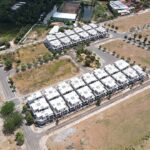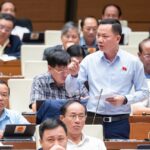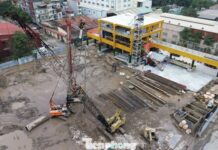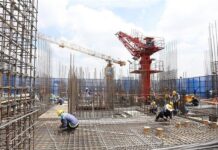Leading the Market in Pricing
“The new supply entering the Hanoi market since the beginning of the year has primarily been subsequent phases of existing urban areas or projects with secondary land transfer funds. Meanwhile, the number of newly approved projects remains scarce. The lack of competition in the market, dominated by a group of investors, has established a new price level, making it difficult for prices to decrease,” shared a leader of a Hanoi-based real estate company with VietNamNet amid the wave of continuous price increases in the real estate market.
This leader opined that the “monopoly” on supply has caused secondary home prices to skyrocket, following the new price level. Previously, one could afford a condo in Hanoi with 2-3 billion VND, but now the price range has jumped to 4-5 billion VND. To address the current issues in the real estate market, a diverse supply through the implementation of numerous projects is essential.

The pilot project for commercial housing through agreements on the receipt of land use rights or the current land use rights requires the responsibility and caution of state agencies. Illustration: Nam Khanh
|
Commenting on the pilot project allowing enterprises to purchase non-residential land for commercial housing development, Dr. Nguyen Van Dinh, Chairman of the Vietnam Real Estate Brokers Association (VARs), stated that it not only resolves legal difficulties for commercial housing projects “stuck” due to the absence of residential land elements but also enhances land access and encourages investors to develop projects, contributing to increasing the housing supply for the market.
However, Dr. Dinh emphasized that the conversion and receipt of conversion processes still necessitate the support of state management agencies.
“Agreements with landowners whose land is planned for residential purposes to develop commercial housing may encounter challenges due to landowners’ reluctance to convert or their desire to transfer at exorbitant prices. Therefore, in the long term, regulations should aim for the state to assume the role of the largest land provider, implementing economic and social development projects through auctions or land-use bidding, ensuring a balanced market and improved housing accessibility for citizens,” stated Dr. Dinh.
From a business perspective, Mr. Pham Duc Toan, General Director of EZ Property, who has observed the real estate market for nearly 15 years, evaluated the pilot project as a positive mechanism to address issues in land allocation and retrieval. He underscored the importance of implementation, stating, “I believe the most critical aspect is for localities to be dedicated and determined to support businesses. In the past, there have been instances where localities were afraid to make mistakes and waited for document guidance, resulting in delays measured in months. This also prolongs project execution. If there is still a reluctance to take action, any law or regulation introduced will face challenges. The longer the investment cycle, the higher the costs, ultimately leading to higher prices. The key lies in effective implementation.”
Pilot as a Starting Point, but More Solutions Are Needed
While supporting the pilot project for commercial housing through agreements on land use rights or current land use rights, Assoc. Prof. Dr. Nguyen Quang Tuyen, Vice President of the Hanoi Law University and Head of the Economics Law Faculty, cautioned about the responsibility and prudence required from state agencies during the implementation process.
“Since it is a pilot resolution, there should be a selective approach to prevent rampant and widespread exploitation, especially in converting agricultural land for other purposes. In my opinion, it would be best to initiate the pilot in localities with a high demand for housing,” suggested Dr. Tuyen.
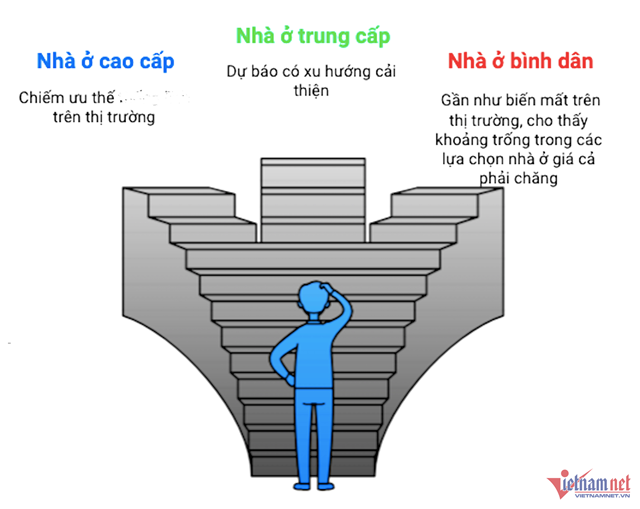 It is essential to recognize that the current market demand is for affordable housing. Illustration: Hong Khanh
|
According to the expert, the pilot project will positively impact the housing supply, catering to the market’s needs. However, it is vital to acknowledge that the market demand is for affordable housing that aligns with the financial means of the citizens.
“The pilot resolution is a starting point, but more solutions are necessary. While there have been efforts to streamline procedures for land access, challenges persist in many specific cases. Therefore, the most critical aspects are procedures and implementation,” emphasized Dr. Tuyen. He also suggested focusing on mechanisms to encourage and attract various economic sectors to establish housing for low-income individuals. Additionally, he stressed the importance of regulating the real estate market to prevent speculation and price manipulation.
“Many people have a speculative mindset, buying and selling for profit, which drives up prices and hinders sustainable market development. When formulating policies for housing construction, the primary goal should be to provide homes for citizens. Therefore, it is imperative to unlock investment resources. If people with idle money continue to speculate and hoard land for profit, it will create pressure, and there will be many issues to address with resolute solutions,” asserted Dr. Tuyen.
Echoing the importance of implementation by managing agencies and local authorities, Mr. Nguyen The Diep, Vice President of the Hanoi Real Estate Club, noted that laws should also include certain disciplinary measures reflecting the responsibility of managing agencies.
“We should not aim for perfection in our laws, but when challenges arise, we must address them immediately. The authorities implement, and the businesses execute. State management agencies must also be accountable for their actions, demonstrating their responsibility and the increasing delegation of power to localities. It is crucial for local authorities to take decisive action. They should immediately facilitate enterprises by streamlining procedures for project deployment. On the other hand, businesses should closely collaborate with local authorities to devise optimal solutions for project implementation,” asserted Mr. Diep.
Hong Khanh
The Privileged Choose to Live the “Resort Life” at Eurowindow Twin Parks
Amidst the concrete jungle of urban life, the elite are seeking a sanctuary that offers a true resort-style experience – and they’re finding it at Eurowindow Twin Parks. With its attractive year-end incentives, now is the golden opportunity for investors to secure their own slice of this exclusive, upscale living environment.
Is Agricultural Land in Ho Chi Minh City Still an Attractive Investment Prospect?
The pressure to clear inventory and slash prices is mounting for investors in agricultural land on the outskirts of Ho Chi Minh City. However, this urgency to offload investments is not reflected in the market’s transaction volume. As land investors fret over potential losses, service businesses operating on this land are breathing a sigh of relief, thanks to the newfound legal framework that has unlocked opportunities.
“Addressing the Soaring Property Prices: A Proposal to Tax Vacant Properties”
The Parliamentary Supervision Delegation recommends expediting the completion of research and proposing amendments and supplements to the tax laws. This includes the enactment of new legislation that introduces higher tax rates for individuals who occupy large land areas and own multiple residences, as well as for those who fail to utilize their land promptly or leave it abandoned.
“A Focused Approach: Targeting the Affordable Housing Market of $2.5 Billion and Below”
In the National Assembly session on October 28, a representative suggested that the government should focus on the affordable housing segment, specifically properties valued at 2.5 billion VND and below. This targeted approach would prevent the government from spreading its resources too thin. However, it is crucial to streamline the processes and avoid a bureaucratic maze when implementing social housing support policies.


